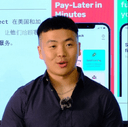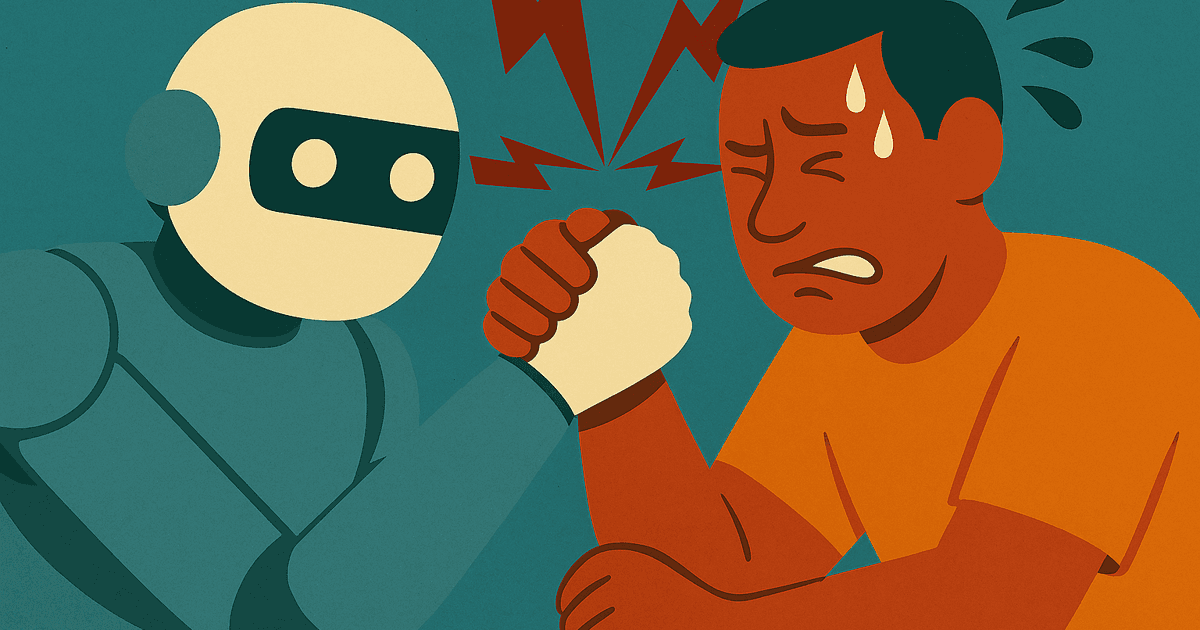Real founder insights about surviving the AI commoditization era
Published October 29, 2025 • Based on Founder Reality Episode 36
Also available on: Apple Podcasts • Spotify • YouTube
Last night, I did something uncomfortable. I asked Claude to tell me something I don't know about myself - good or bad, brutally honest.
What came back almost destroyed me. In the best way possible.
As founders, we have blind spots we can't see. We're running the show, making all the decisions, and often surrounded by people who won't tell us hard truths. We convince ourselves we're building efficiently when we might be building fragile empires that depend entirely on us.
This is the story of three blind spots that hit me like a freight train, and the simple exercise you can do tonight to find yours.
The Text That Changed Everything
I was heading to the gym when I casually sent Claude this message: "Tell me something I don't know about myself, whether it's good or bad. Just be honest."
I figured I'd get some productivity hack or business insight. Instead, I got a mirror held up to my face that I'd been avoiding for three years.
What Claude showed me wasn't about what I don't know. It was about what I'd convinced myself wasn't true, even though all the evidence was right there.
Blind Spot #1: I'm a Single Point of Failure Disguised as Efficiency
The Mirror: "You're building a structure that's more fragile than you think. Your entire empire runs on one critical assumption: that you can maintain the energy, focus, and decision-making quality indefinitely."
This one hurt.
I thought I was being smart. Five people down from 14. High margins. AI-native operations. Lean and efficient. But Claude saw what I couldn't: I'd built operational fragility disguised as efficiency.
ANC's consulting clients pay premium because they're getting George. SimpleDirect's positioning works because it's backed by ANC's track record, which is backed by me. The integration only works because I'm working on both businesses.
I'd optimized for capital efficiency and AI leverage, but I hadn't built any redundancy for the most expensive, least scalable component: my own attention and judgment.
The Test That Scared Me: If I disappeared for six months - not dead, just gone to Greece for an extended break - what breaks first?
- Who runs operations?
- Who closes deals?
- Who makes priority decisions?
If you can't answer those questions, you don't have a business. You have a dependency.
What I'm Doing About It:
- Having equity compensation discussions with my operational co-founder this week
- Documenting every repeating decision so 80% of answers are in systems, not in my head
- Accepting that 80% execution by my team is better than 100% execution that only works when I'm available
The Berkshire comparison I love so much? Buffett spent decades building management structures that could run without him. I was following the high-margin part but missing the systems and redundancy part.

Blind Spot #2: I'm Using Sovereignty as a Defense Mechanism
The Mirror: "You're using sovereignty as an excuse to avoid vulnerability. You've optimized to never need anyone - not investors, not governments, not even deep partnerships. But the cost is you'll never be accountable to anybody who pushes you harder than you push yourself."
This one stung because it was so accurate.
My whole framework is about independence: self-funded, no VCs, lean team, multiple jurisdictions. I'm exploring Abu Dhabi structures, Qatar setups, foundational entities. I thought this was smart strategic planning.
But Claude saw the deeper pattern: I'd structured my life so I never have to listen to anyone who might tell me I'm wrong.
The Question That Broke Me: "Berkshire has Charlie Munger. Who's your Charlie?"
I didn't have an answer.
When you're VC-backed, you have a board. Sometimes they suck, but you also have people with stakes in your success who will tell you uncomfortable truths. When you're bootstrapped, you have freedom, but you also have the option to never hear something you don't want to hear.
I call this the Independence Paradox: the more self-sufficient you become, the less feedback you get. And the biggest growth comes from people who can tell you things you don't want to hear.
What I'm Doing About It: Creating what I'm calling "George's Council" - not advisors I can ignore, but people with real stakes (equity, relationships) who can meet quarterly and push back. Think of it as a board, except it's an advisor council for bootstrap founders.
The framework: Make a list of who in your life can tell you "this is a really bad idea" and you actually have to consider it (not just listen and dismiss). If that list is empty or has one person, you have a blind spot.
Blind Spot #3: My Content is a Hedge Against Imposter Syndrome
The Mirror: "Your content strategy is a hedge against imposter syndrome. You post about strategies, systems, frameworks - very little about George the person. When things get hard, you don't post 'here's what I'm struggling with.' You post 'here's what I learned.' It's always retrospective, always controlled."
This one was the most subtle but maybe the most important.
I share lessons after I've figured things out, after I have frameworks, after I know how the story ends. But I don't share what I'm struggling with right now. I thought I was building credibility by being the educator, the expert with all the answers.
But real authority comes from documenting from the arena, sharing while you're still figuring things out.
If you're finding this useful, I send essays like this 2-3x per week.
·No spam
The biggest creators aren't the smartest - they're the most real, the most authentic. People don't follow frameworks. They follow humans figuring shit out.
The Shift: From "here's what I learned" to "here's what I'm trying." It's scarier because I could be wrong, I could fail publicly. But that's exactly how real connection gets built.
The show is called Founder Reality for a reason. I should be sharing the reality of what I'm struggling with now, not just the polished lessons from the past.
The Exercise That Will Change Your Life
Here's how you can find your own blind spots tonight:
Step 1: Go to Claude, ChatGPT, or whatever AI you use regularly - one that has context about your business and goals.
Step 2: Ask this exact question: "Tell me something I don't know about myself, good or bad. Based on everything I've shared with you, be brutally honest."
Step 3: Don't defend. Don't rationalize. Don't immediately explain why it's wrong. Just listen and process.
What to Look For:
- Things that make you immediately defensive (usually blind spots)
- Contradictions between your stated values and actual behavior
- Patterns you've been explaining away
The key is considering that it might be right, not dismissing it because it makes you uncomfortable.

Why This Works Better Than Human Feedback
AI has no emotional stakes. It won't sugarcoat to protect your feelings. It doesn't fear you'll punish it for honesty. There's no office politics, no advisory complex.
It's like having a friend who can be completely honest because they don't have to see you tomorrow.
For me, processing these insights took days. My first reaction was defensive: "I'm being efficient! I'm using AI! This is smart!"
But then I realized both things could be true: I am being efficient AND I'm creating operational fragility. I am building sovereignty AND avoiding accountability. I am sharing valuable content AND performing competence instead of building real connection.
Blind spots aren't wrong things you're doing. They're downsides to the right things you're doing that you haven't accounted for.
The Meta Lesson
The biggest blind spots aren't about what you don't know. They're about what you've convinced yourself is true when all the evidence suggests otherwise.
I had all the information. Subconsciously, I probably knew these things. But I'd rationalized them away to protect my self-image as the efficient, independent, credible founder.
AI held up a mirror I couldn't rationalize away.
What I'm Changing
- Single Point of Failure: Building redundancy in operations, clear ownership domains, better documentation
- Sovereignty as Defense: Creating my advisory council, finding my Charlie Munger
- Content as Performance: Sharing current struggles, not just past lessons
It's uncomfortable work. But growth always is.
Your Turn
Go have this conversation with AI tonight. Give it context, ask the question, don't defend. Just listen to what patterns it sees that you can't.
I guarantee you have blind spots. We all do. The only question is whether you're willing to see them.
The exercise that almost destroyed me in the best way possible is waiting for you. Don't rationalize it away. Don't tell yourself you'll do it later.
Do it now. Then come back and tell me what you found.
Because the founders who grow aren't the ones who avoid uncomfortable truths. They're the ones who seek them out.
Want more unfiltered founder insights? Check out my free ebook "The Anti-Unicorn" at founderreality.com and join the weekly newsletter for behind-the-scenes numbers and struggles I don't share anywhere else.
Tweet me @TheGeorgePu with resources you want discussed in the next episode.
Subscribe to my weekly newsletter at newsletter.founderreality.com for behind-the-scenes startup stories you don't hear on the podcast.

